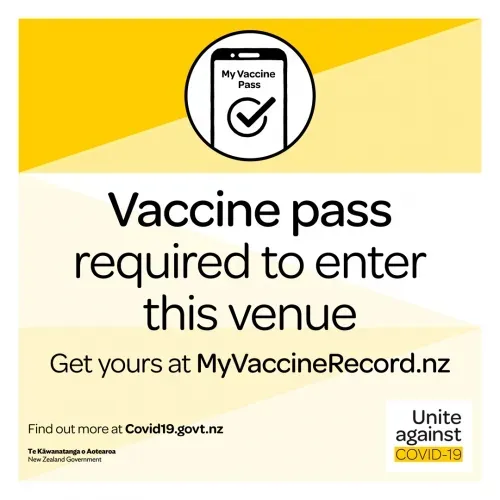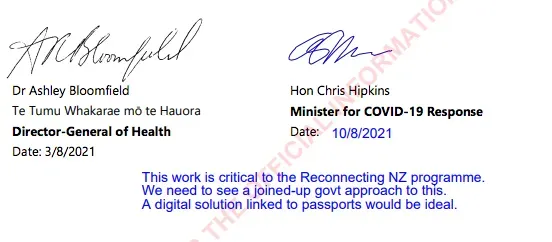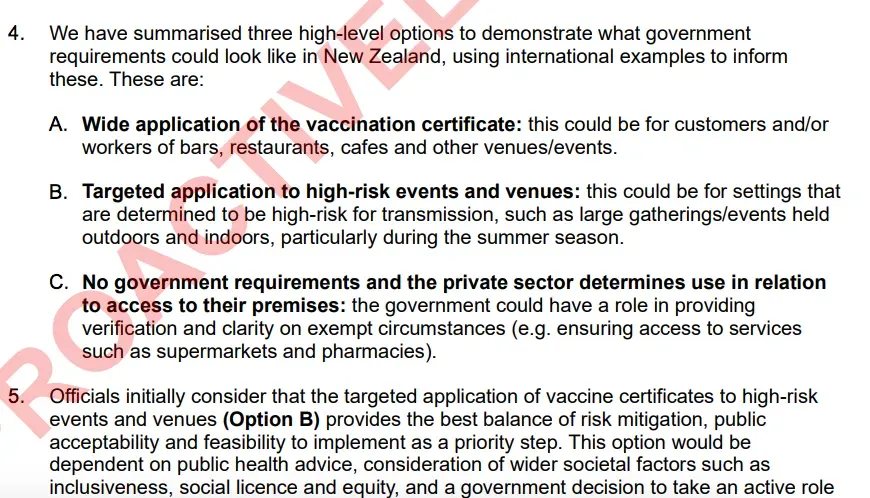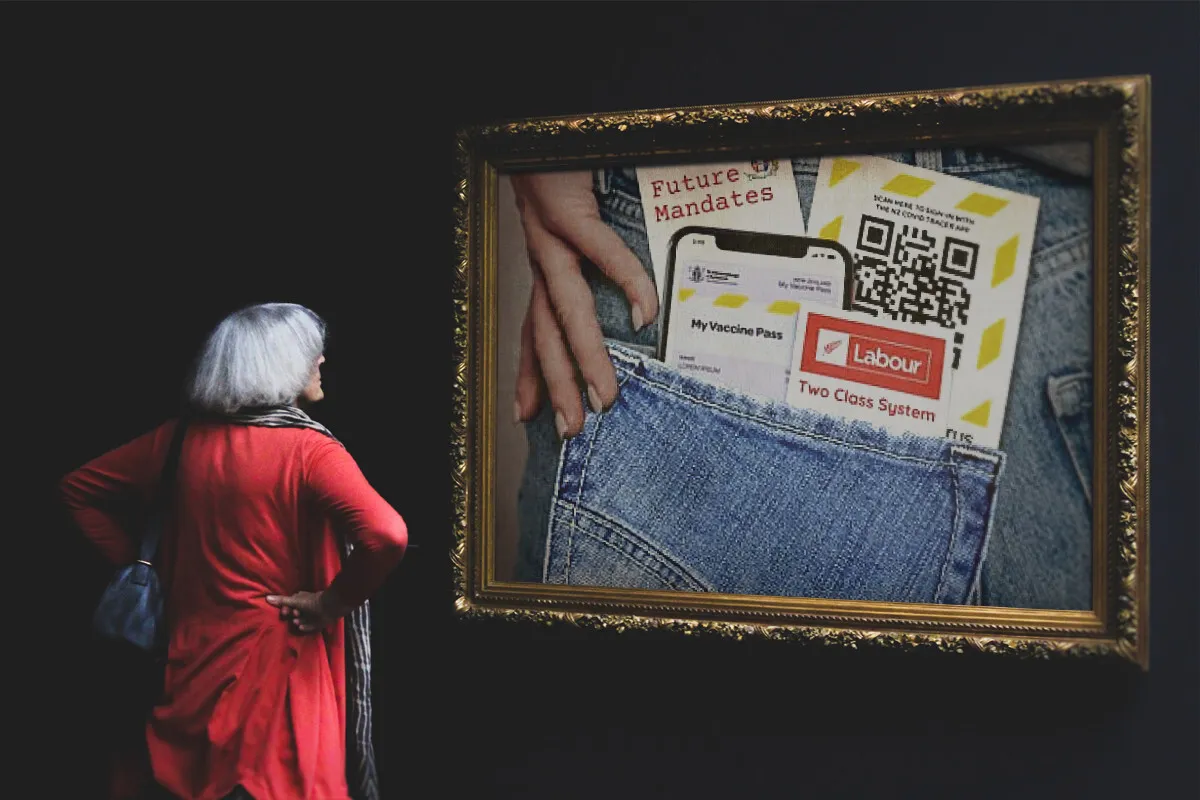Table of Contents

In a May 16th interview, Robert Redfield the former Director of the Centers for Disease Control and Prevention (CDC), said of Covid vaccines “They’re important for the most vulnerable people, those over 60, 65 years of age. They really aren’t that critical for those who are under 50 or younger”.
Yet domestic vaccine passes in New Zealand were to persuade the young and healthy to get vaccinated.
Initially led by the Ministry of Transport – in 2020 they convened a Multi Agency Travel Pass forum with the Ministry of Health to consider how an international travel certificate would work if required. It had a decidedly unhurried tone to it – likely due to the late vaccine rollout in New Zealand – but the Ministry of Health had 8 staff involved in April 2021 to progress it.
The first explicit mention of domestic vaccine passes comes from an OIA that released a 17th of May 2021 memo to the Covid-19 Vaccine and Immunisation Steering Group. It noted that a position on domestic vaccine passes would need to be developed and stated the use of passes was under an “assumption” being vaccinated reduces the risk of spreading the virus.
In June 2021 the Prime Minister’s Chief Science Advisor Juliet Gerrard briefed then Prime Minister Jacinda Ardern on Israel’s success at vaccination, including a ‘green pass’ as part of their traffic light model. The briefing shows New Zealand ended up copying Israel’s traffic light model – despite the fact Israel had already canned their green passes by the time Gerrard did the briefing. The pass hadn’t stopped infections and Gerrard didn’t note that down but rather referred to the pass as ‘incentivising’ vaccination. (Months later as the pass was the subject of Cabinet briefings on how it could be used, Gerrard was showing Ardern graphs that Australia’s high vaccination rates were not curbing infections.)
A 30th of July 2021 memo on proof of vaccination in the context of travel to then Covid-19 Minister Chris Hipkins noted the the effects of vaccines affecting transmission was still under review. This is despite workplace mandates being put in place in April 2021 based on the public health grounds that it may, with limited data, be effective in limiting transmission.
The memo went on to bizarrely then state “…once vaccinated, approximately <0.5% of Pfizer vaccinated individuals become infected (‘breakthrough’ infections)…”
This appears to be Hipkins’ notes on signing the briefing:

It’s curious what was happening outside these documents, as in early August 2021 Ardern called herself “not keen” in an interview on considering vaccine passes like those still in place Europe.
Something must have rapidly changed as a 17th of August memo shows the Ministry of Health “….will be undertaking policy work to explore the ethical, legal, equity and public health considerations regarding domestic use of vaccination certificates” and that “…the introduction of these requirements varies and appears to be in part to manage the potential for transmission but also to incentivise vaccination”.
This memo was repackaged from the policy analyst who wrote it to be from the head of the Covid vaccination program Jo Gibbs and was sent to Covid Ministers on the 26th of August.
September saw a briefing delivered to Hipkins and copied to Ardern on how domestic vaccine passes could be used:

This work was publicly kept quiet although a DPMC OIA requested more information based on a 10th of September 2021 press conference where then Minister of Finance Grant Robertson was asked if there were any plans for a domestic certificate – he responded conversations were underway. The OIA denied this and claimed there was nothing to release.
A few days later another briefing was sent to Hipkins and Ardern that centred on using passes at large events (above 1,000 people) and how to ensure essential services were prohibited from requiring them. The day before this briefing – the Assistant Privacy Commissioner gave feedback on the proposal.
Privacy and scope creep concerns
An OIA has the emails the Department of the Prime Minister and Cabinet (DPMC) sent out to an all of government group to gather their views on a domestic vaccine pass.
With less than a day to respond to this highly rights-limiting pass, feedback was varied and uncertain (the emails are covered in more depth in a post on how vaccine passes were dishonestly ended). Assistant Privacy Commissioner, Liz MacPherson queried employers knowing medical information and suggested it could lead to issues like businesses promoting themselves as fully vaccinated (using what had been private medical information).
MacPherson pushed back on the Ministry of Health suggested data to display as being intrusive health information – the pass only needed an authorisation to enter not details of the date of a 2nd dose or test result details (which was still being considered but unlike other countries, New Zealand ended up having no opt out).
MacPherson also worried about scope creep in the use of the domestic vaccine passes:

Scope creep was a concern the New Zealand Civil Liberties Union had when they fought to give feedback under urgency too.
Vaccine pass use relied on leveraging the Digital Identity Trust Framework (which was going through the Select Committee process at the time) – aka a Digital ID. The implementation of vaccine passes were credited in a press release as allowing a project to create a digitised central health record called HIRA to move forward.
The reason for vaccine passes
But despite still seeking feedback, work had already begun on developing the passes. An OIA with emails between the Ministry of Health and Apple and vendor Mattr show that in mid-September 2021 implementation work was urgently being done over weekends to get the pass working in time for it to be used.
A presentation sent to Ardern in the OIA dated the 24th of September has a problem statement specifically calling out ‘young and healthy’ vaccination rates as behind the rest of the population and that a pass should support motivating vaccinations and providing a public health control at large scale events such as summer festivals:

Even prior to vaccine passes – vaccination intent research and nudging commissioned by DPMC to improve compliance noted “Youth represent the greatest risk of non-compliance, and are less likely to respond to community-based messages. Social positive social norming among youth, not just the whole population, will be important”. The vaccine pass problem statement concentrated on those least at risk being deemed most important to get vaccinated. Events where effectively were the young and healthy would gather hence the initial focus on events.
By the 27th of September a Cabinet paper Strategy for a highly vaccinated New Zealand discussed vaccine certificates and moving from Alert Levels with lockdowns to a traffic light framework on the premise high vaccination meant less cases, any outbreaks would be easier to stamp out through targeted rather than nationwide lockdowns, and still included contact tracing and testing, and hospitalisations would be made up of the unvaccinated (rather than those who were at risk of poor outcomes from Covid). It relied on modelling and even thought over 5s being vaccinated would “…improve the transmission reduction attributable to the vaccination campaign”.
The announcement of the domestic vaccine pass & its purpose
Domestic vaccine passes were announced by Ardern on the 5th of October 2021 for summer events and Ardern claimed they were still ‘consulting with other industries’.
Hospitality lobbied for the passes in an effort to remove Covid restrictions on gathering sizes and social distancing. The CEO of Hospitality NZ said “We support vaccination certificates, because we’re desperate to open, but the government must pass a law that protects us from legal action and costs”.
When the New Zealand Council of Civil Liberties (NZCCL) originally submitted feedback they wanted to understand the reasons for the passes in order “…to judge over time whether the limitation has been proportionate or not, we will need to compare the benefits gained against the negative consequences”. NZCCL ended up making a complaint on the lack of transparency to the Ombudsman which eventually prompted an apology from DPMC.
However, documents on domestic vaccine passes (including within OIAs) showed briefings and Cabinet papers had no clear discussion of metrics nor assessments to determine if the intention of domestic vaccine passes – whether it was to curb infections or nudge vaccination – was ever met.
An October news article quotes Associate Professor in bioethics at Otago University, Angela Ballantyne questioning the reason for the passes “It’s not clear to me whether this is primarily designed to be a carrot that gets us up to 90 per cent or a stick after we get to 90 per cent to encourage those who remain unvaccinated to get vaccinated”. A University of Waikato brief on the implications of the domestic vaccine pass to Maori concurred.
Talking points released in a November 2021 OIA re-iterated that events was the focus “We are currently working with the events and hospitality industry to determine when proof of vaccinations might be required for entry to events and venues….” It also stated the use of the passes would reduce risk of the virus spreading.
Implementation of passes
A contract with Mattr who the Ministry of Health had been working with was signed on the 13th of October.
A briefing dated the 14th of October on domestic use of covid-19 certificates in high risk settings defined high risk events as again over 1,000 people “especially while COVID-19 vaccination rates are lower than optimal”. (Optimal was a debatable term – New Zealand solid and growing rates of vaccination at that time.)
The briefing also gave the reason for not allowing prior infection as an alternative to a vaccine pass because “…there has not been widespread COVID-19 infection in New Zealand, meaning this would not be available for most people. This may need to be revisited in future”. The briefing stated there were less than 200 people in the entire country who could be considered exempt from the requirement for vaccination.
However, the Cabinet paper that recommended the passes in late October did not go with the events only option as assumed and proposed by the Ministry of Health on public health grounds – the official advice for using domestic vaccine passes was ignored.
Domestic vaccine passes were implemented under urgency in Parliament and became officially required on midnight the 3rd of December 2021 at not just events but at any close contact business such as hairdressers, salons, gyms, cafes, bars and restaurants, churches, vets, swimming pools, activities and entering offices and workplaces.
The October Cabinet paper says it’s “…preferable that all eligible people in New Zealand would have sufficient opportunity to be vaccinated”. The October Super Saturday vaxathon was probably no coincidence. Nor was the gap between doses lowering from 6 weeks to 3 weeks – also done in October 2021 – a coincidence.
For all the rhetoric on equity that cropped up through the Covid response – the Cabinet paper shows how empty the phrase can be ”Currently, the disproportionately lower vaccination levels for Maori means that limiting access to domestic facilities based on vaccination status would have a greater effect on the personal freedom of Maori on an individual and collective basis”.
How vaccine passes were used
It seems relevant to note that only 2 days before domestic passes were introduced in December 2021, the push to get a booster started because the primary series which the domestic vaccine pass relied on – wasn’t enough protection due to waning effectiveness!
A briefing to Hipkins called further advice on prohibited settings noted that vaccine passes should be prohibited at life saving and essential services. Unlike Canada vaccine passes were not required on public transport in case people were travelling to hospital or medical services, which is also why only domestic air or ferry travel had the ability to submit a RAT test in lieu of the vaccine pass.
Despite what the briefing said many government services limited access to their physical offices or services based on vaccine passes – including at local government levels. Services like public swimming pools and libraries required vaccine passes to access. All of which came at a cost – an OIA to Nelson council showed they spent $21k just checking people’s passes on entry. Passes even ended up being required to stay in Department of Conversation huts while hiking on remote trails.
Private companies cashed in too – a company still has a web page to add your photo to create a plastic card!
A December 2022 OIA to Health NZ asked about the basis of both vaccination mandates and domestic passes and got a generic response that “…both policies were intended to reduce transmission and to protect vulnerable populations”.
The end of domestic vaccine passes
An OIA on the verifier app, used to scan the pass for authenticity, showed high uptake right after they were introduced – then it rapidly tailed off. By March 2022 this science media ‘expert reaction’ noted that domestic vaccine passes based on the primary series were largely useless.
The hospitality industry who had lobbied for their use – was by April clamouring for them to be gone.
The NZCCL in their initial feedback pointed out “Finally, the government has not been clear about what the criteria are for when the certification system will be ended”.
Alongside a stricter community mask mandate, cases simply exploded – despite the domestic vaccine pass. After stumbling to add boosters to the passes, in the aftermath of a protest at Parliament against Covid restrictions, the government ditched domestic vaccine passes at midnight on the 4th of April 2022 in favour of allowing businesses to choose (and businesses promoted themselves as fully vaccinated – something the Privacy Commissioner warned about).
This post was originally written in 2 parts in April 2023. If you liked this post other posts to read are why boosters were never added despite Ardern and Hipkins hinting they would be – and a full account of the murky documents that led to the end of domestic vaccine passes.









